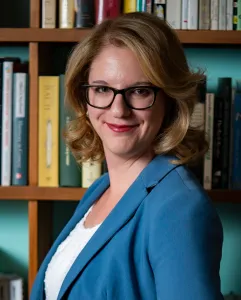Alumni Spotlights – Paula Maust
Paula Maust
(DMA ’19 & MM ’16, harpsichord)
Music Theory Professor, Harpsichordist
 Dr. Paula Maust is the creator of Expanding the Music Theory Canon, a collection of music theory examples by historical women and people of color that is used around the world. Her print anthology based on the same concept was released in 2023 with SUNY Press. Paula is also an early modern editor for the Grove Music Online Women, Gender, and Sexuality revision project. As a harpsichordist and organist, Paula co-directs Musica Spira, a baroque chamber ensemble committed to amplifying the stories of early modern women musicians. Paula is an Assistant Professor of Music Theory at Peabody.
Dr. Paula Maust is the creator of Expanding the Music Theory Canon, a collection of music theory examples by historical women and people of color that is used around the world. Her print anthology based on the same concept was released in 2023 with SUNY Press. Paula is also an early modern editor for the Grove Music Online Women, Gender, and Sexuality revision project. As a harpsichordist and organist, Paula co-directs Musica Spira, a baroque chamber ensemble committed to amplifying the stories of early modern women musicians. Paula is an Assistant Professor of Music Theory at Peabody.
Tell us about your journey to your current career path. What were the pivotal moments? What surprised you?
I have had several pivotal career-altering realizations that have significantly shaped my path. About 12 years ago, I grudgingly played the harpsichord in a baroque ensemble to earn an ensemble credit for my degree. I had never played a harpsichord before, but I quickly discovered that the instrument and repertoire allowed me to pursue all the things that I loved the most: music theory (realizing figured bass), musicology (archival score and composer research), and playing chamber music. It changed my life, and I eventually got a DMA in harpsichord and play professionally all over the region now. I was also equally surprised to discover, while working as a theory graduate assistant, that I have a passion for teaching music theory, which I now have the privilege of doing full-time at Peabody.
What opportunities did you take advantage of in school that helped you to build helpful skills and experiences?
I tried to develop collaborative relationships with as many of my peers as possible in school. I played for countless student recitals, accompanied lots of lessons, and moved and tuned a lot of harpsichords! Not only did these experiences make me a better musician, they also connected me to a large network of people who are now my colleagues. I formed my own professional ensemble out of these collaborations.
How has your network and/or community impacted your professional journey?
I am exceptionally grateful to the network of historical performance practice, musicology, and music theory professors that I developed during my time as a student at Peabody. It was the historical performance faculty who initially started referring me for gigs. While I (of course!) had to show up and do a good job to get hired again, it was their initial referrals that first propelled my performance career. My mentors in the theory and musicology department helped me write my first conference proposals and articles and guided me through the academic job market. I absolutely would not be where I am today without the network I developed at Peabody.
Who has been an influential mentor for you and why?
I was incredibly fortunate that I got to work as a theory graduate assistant for Dr. Mark Janello during my MM degree at Peabody. Mark came to all my recitals, wrote me countless letters of recommendation, and was always available to give me career advice. When I started teaching my own theory courses, he generously shared materials and ideas with me and mentored me through the academic job market. I consider myself very lucky to now be his colleague on the theory faculty at Peabody!
Have your goals and priorities changed over time? If so, how?
When I was in elementary school, I wanted to be a concert pianist and an author. I have held onto that vision and strategically worked towards it for decades, although I did ultimately pivot from the piano to the harpsichord. During graduate school, I developed a passion for teaching music theory and a goal of helping music students connect theory and analysis to their own creative practices. Being aware of social and structural inequities has also always been important to me, and I try to make sure that my scholarly and artistic work is reflective of those values.